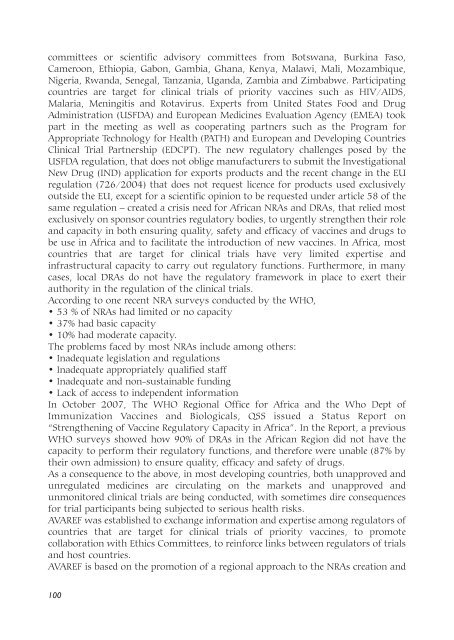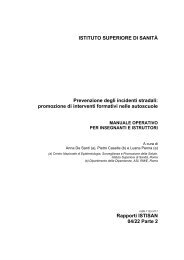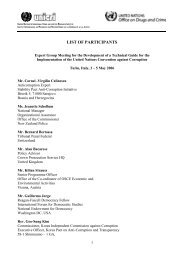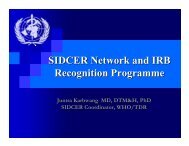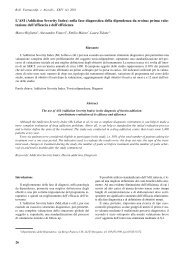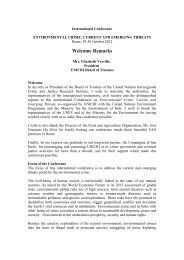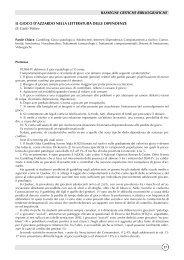Biomedical Research in Developing Countries - UNICRI
Biomedical Research in Developing Countries - UNICRI
Biomedical Research in Developing Countries - UNICRI
You also want an ePaper? Increase the reach of your titles
YUMPU automatically turns print PDFs into web optimized ePapers that Google loves.
committees or scientific advisory committees from Botswana, Burk<strong>in</strong>a Faso,<br />
Cameroon, Ethiopia, Gabon, Gambia, Ghana, Kenya, Malawi, Mali, Mozambique,<br />
Nigeria, Rwanda, Senegal, Tanzania, Uganda, Zambia and Zimbabwe. Participat<strong>in</strong>g<br />
countries are target for cl<strong>in</strong>ical trials of priority vacc<strong>in</strong>es such as HIV/AIDS,<br />
Malaria, Men<strong>in</strong>gitis and Rotavirus. Experts from United States Food and Drug<br />
Adm<strong>in</strong>istration (USFDA) and European Medic<strong>in</strong>es Evaluation Agency (EMEA) took<br />
part <strong>in</strong> the meet<strong>in</strong>g as well as cooperat<strong>in</strong>g partners such as the Program for<br />
Appropriate Technology for Health (PATH) and European and Develop<strong>in</strong>g <strong>Countries</strong><br />
Cl<strong>in</strong>ical Trial Partnership (EDCPT). The new regulatory challenges posed by the<br />
USFDA regulation, that does not oblige manufacturers to submit the Investigational<br />
New Drug (IND) application for exports products and the recent change <strong>in</strong> the EU<br />
regulation (726/2004) that does not request licence for products used exclusively<br />
outside the EU, except for a scientific op<strong>in</strong>ion to be requested under article 58 of the<br />
same regulation – created a crisis need for African NRAs and DRAs, that relied most<br />
exclusively on sponsor countries regulatory bodies, to urgently strengthen their role<br />
and capacity <strong>in</strong> both ensur<strong>in</strong>g quality, safety and efficacy of vacc<strong>in</strong>es and drugs to<br />
be use <strong>in</strong> Africa and to facilitate the <strong>in</strong>troduction of new vacc<strong>in</strong>es. In Africa, most<br />
countries that are target for cl<strong>in</strong>ical trials have very limited expertise and<br />
<strong>in</strong>frastructural capacity to carry out regulatory functions. Furthermore, <strong>in</strong> many<br />
cases, local DRAs do not have the regulatory framework <strong>in</strong> place to exert their<br />
authority <strong>in</strong> the regulation of the cl<strong>in</strong>ical trials.<br />
Accord<strong>in</strong>g to one recent NRA surveys conducted by the WHO,<br />
• 53 % of NRAs had limited or no capacity<br />
• 37% had basic capacity<br />
• 10% had moderate capacity.<br />
The problems faced by most NRAs <strong>in</strong>clude among others:<br />
• Inadequate legislation and regulations<br />
• Inadequate appropriately qualified staff<br />
• Inadequate and non-susta<strong>in</strong>able fund<strong>in</strong>g<br />
• Lack of access to <strong>in</strong>dependent <strong>in</strong>formation<br />
In October 2007, The WHO Regional Office for Africa and the Who Dept of<br />
Immunization Vacc<strong>in</strong>es and Biologicals, QSS issued a Status Report on<br />
“Strengthen<strong>in</strong>g of Vacc<strong>in</strong>e Regulatory Capacity <strong>in</strong> Africa”. In the Report, a previous<br />
WHO surveys showed how 90% of DRAs <strong>in</strong> the African Region did not have the<br />
capacity to perform their regulatory functions, and therefore were unable (87% by<br />
their own admission) to ensure quality, efficacy and safety of drugs.<br />
As a consequence to the above, <strong>in</strong> most develop<strong>in</strong>g countries, both unapproved and<br />
unregulated medic<strong>in</strong>es are circulat<strong>in</strong>g on the markets and unapproved and<br />
unmonitored cl<strong>in</strong>ical trials are be<strong>in</strong>g conducted, with sometimes dire consequences<br />
for trial participants be<strong>in</strong>g subjected to serious health risks.<br />
AVAREF was established to exchange <strong>in</strong>formation and expertise among regulators of<br />
countries that are target for cl<strong>in</strong>ical trials of priority vacc<strong>in</strong>es, to promote<br />
collaboration with Ethics Committees, to re<strong>in</strong>force l<strong>in</strong>ks between regulators of trials<br />
and host countries.<br />
AVAREF is based on the promotion of a regional approach to the NRAs creation and<br />
100


